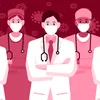How the healthcare industry is preparing for post COVID-19 lockdown era
In the short term, healthcare experts and organisations should be prepared for the possibility in spurt of COVID-19 cases in areas that have partially lifted the lockdown.
While the COVID-19 pandemic has strained the healthcare system not only in India but worldwide, another challenge that is round the corner is how will the healthcare models evolve once the lockdown is lifted.
There is no way hospitals can go back to functioning how they used to. A lot of changes will have to happen on the administrative and clinical level to adapt to the paradigm shift that this pandemic has created.
Greeting each other with folded hands might become a lifestyle, shaking hands and hugging in public would go out of fashion, and ensuring social distancing, hand hygiene, and wearing masks will be a normal practice in the future, at least till the world gets vaccinated.
Imposing lockdown and then eventually going from partial to no lockdown has been a social vaccine in curbing this tactical war. With no set treatment of drugs for the cure of COVID-19, scientists and healthcare experts across the world have been left in a jiffy, resorting to social distancing as the only vaccine.

In the short term, the immediate action for which healthcare experts and organisations should be prepared for is the possibility in spurt of COVID-19 cases in areas that have partially lifted the lockdown, which may or may not lead to reversing the situation to complete lockdown again.
Additionally, once the lockdown is lifted, there might be an increase in patient flow, especially people who have elective surgeries planned and pending for over two months now.
Ensuring timely treatment and complete patient safety is going to play an important role in restoring the trust of people in visiting hospitals, who have, due to COVID-19 fear, refrained from going to hospitals.
Since getting a COVID-19 test done has become mandatory for a patient who is going for admission in a hospital, administrations need to ensure ease of admission, especially for patients who are undergoing regular treatments like dialysis and chemotherapy.
The larger perspective
An epidemic of this proportion needs a certain infrastructure to deal with. None of the countries, whether developed or developing or poor, have such an infrastructure. Epidemiological handling and preventive strategies of many developed countries have been questioned.
From logistics of essential commodities to healthcare facilities, everything is super-strained in almost all the nations, and with India it has been no different.
There should be an increase in the amount of investments by the government for strengthening the healthcare industry with respect to private public partnership, development of Made in India medical equipment, and a stronger pharma supply chain.
The healthcare industry, with the support of the central government, will have to reduce dependence on China and other countries for the import of medical equipment and technology.
Some of the key things that the government should streamline in the coming months are:
Telemedicine
Encouraging telemedicine to ensure there are no heavy crowds in the hospitals leading to the transmission of any virus to a large gathering is important. Video consultations and tele-consultations have been helpful for patients, and this can be continued even after the lockdown is lifted, and it should be on the health professional’s discretion whether a patient needs face to face physical examination or he can be consulted over video/audio call.
Decline in medical tourism
In India, medical tourism has been an especially important aspect in terms of generating revenue for the sector, but due to COVID-19, it is set to see a downtrend, at least in the short term. Therefore, filling that revenue gap by preparing a parallel plan for medical tourism is crucial.
Rapid anti-body test kits
Once the lockdown is lifted and India opens its borders for international travellers, the government, along with its healthcare infrastructure, needs to prepare themselves against the relapse of COIVD-19 cases.
Further spread of the pandemic could severely burden the healthcare infrastructure of the country and cause further damage to the economy.
Also, at those places that are identified hotspots and has dense population or there is incidence of more migrant population, rapid antibody tests should be conducted.
These rapid antibody instant COVID-19 test kits help examine whether a person has developed antibodies in his or her blood stream to fight the SARS-CoV-2, which indicates whether a person has been exposed to or has Covid-19. The results of these tests take around 25-30 minutes. If the persons test positive, they must be quarantined and subjected to RT- PCR tests even if he/she is asymptomatic.
An asymptomatic patient whose RT-PCR is negative and antibody IgG is positive should be treated as a cured case of COVID with no health risk, and is also immune from getting infected from other positive COVID-19 cases. Such people can then be allowed to carry on their day-to-day activities freely.
Home-isolation of mild COVID-19 patients is a good move by the government, and takes off significant burden from the hospitals.
The healthcare industry across the world will have to continuously adapt to the unprecedented challenges of battling health crisis. Within few months we will be witness to the vast implications that battling COVID-19 has had with respect to government funding healthcare, better supply chains for medicine and medical equipment, and general public awareness around health and hygiene.
Edited by Megha Reddy
(Disclaimer: The views and opinions expressed in this article are those of the author and do not necessarily reflect the views of YourStory.)








